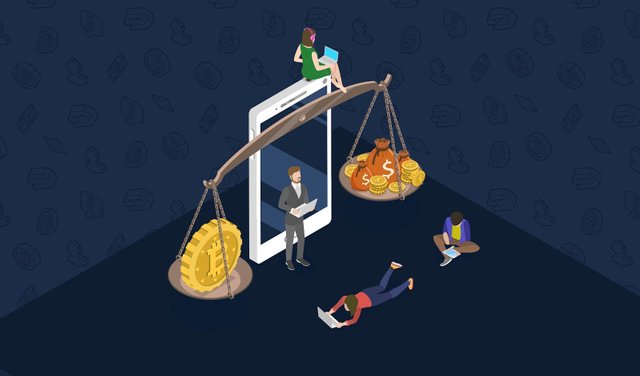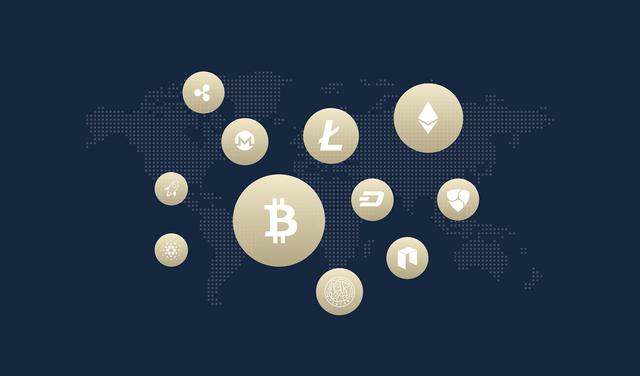Why is Consumer Confidence Building in Crypto?
How is Consumer Confidence Growing?
There are two factors that can improve consumer confidence in cryptocurrencies. The forces having a positive effect on cryptos and the forces having a negative effect on fiat currencies.
In 2008 the world was hit by a global financial crisis brought on by the inherent shortcoming of financial institutions and the banking system. Shortly after, a person (or people) under the pseudonym Satoshi Nakamoto implemented Bitcoin, an alternative peer-to-peer cash system that started at a value of just $0.0001. Since then Bitcoin and other cryptocurrencies have flourished, edging closer and closer to mass adoption.
You may be confused at the idea of consumer confidence growing while market prices have plummeted over the last eight months and I can understand why. Data shows that most people who invested in Bitcoin did so at a significantly higher price than the current market value. However, this in itself is impressive. As foreign exchange and crypto trader Siim Õunap says, "The majority of people no longer see cryptocurrencies as a way to earn a quick buck anymore. People are now starting to invest because they can see the value in the long run.” The market correction has washed out the speculative investors and left behind dedicated users which is exactly what these technologies need in order to grow at a sustainable pace.
Distrust
Roughly a decade on from the financial crisis and we are still in an era of scepticism and financial instability. While two thirds of British consumers have confidence that their banks know what they are doing, just 36% trust these banks to be working in their customer’s best interest. What’s worse is these figures are not just restricted to British consumers. The rest of Europe have a similar lack of faith in banking motives: Germany (35%), France (29%), and Italy (30%). One can therefore understand why people are gravitating towards cryptocurrencies given it provides a trustless system, especially when the prospect of another financial crisis may not be far off.

Global Financial instability
There have been numerous events over recent years that are contributing to growing public concerns over our economy.
Brexit
The decision to leave the European Union had an instantaneously negative effect on sterling. Immediately after the result was announced, the value of the pound crashed to a 31 year low, dropping a massive 10% against the dollar and failing to ever regain traction. These drastic economic events affect cryptocurrencies just as much as they do any other currency, stock or bond. Figures by CoinDesk’s USD Bitcoin Price Index have shown that in the days leading up to the Brexit vote, between 1st - 18th June, Bitcoin climbed a massive 47%.
The Rest of Europe
We consider Brexit to be a huge priority, but the truth is that the European Union are wrestling with issues potentially much greater than the departure of the UK.
After eight crisis-filled years surviving off Eurozone taxpayers’ cash, Greece officially exited its third bailout program on August 20th, leaving the nation with a total loan of €322bn that will take 42 years of austerity to pay off. This meagre sign of a potential Greek recovery would be cause for celebration if issues weren’t springing up elsewhere like a game of whack-a-mole.
Italy is now on the brink of a financial recession and their populist coalition spending plans could add €125bn euros a year to their already sky high €2,300bn debt; a far bigger concern than Greece. Italian banks have been loading up on their home countries debt as the regulators still treat all euro-zone government bonds as risk free. This, however, is not the case. The European Central Bank (ECB) which often purchases such debts and reduce the financial strain through quantitative easing (printing money), have stated they will end asset purchasing later this year.
US banks were subjected to vigorous stress tests soon after the devastating impact of the global financial crisis, however the European banks avoided such intense regulatory measures and as a result remain encumbered with a huge mass of non-performing loans (NPL) worth roughly €1 trillion. Italy are in the midst of a complicated political situation and this combined with vulnerable European banks and the end of quantitative easing suggests the EU is teetering on the edge of another financial crisis. Cryptocurrencies that were spawned out of the last downturn, and often described as digital gold, could very well act as a safe haven during such times of economic turmoil.
Trade Wars
Stretching even further abroad, the economic uncertainties continue. After Donald Trump’s election, Bitcoin jumped 4% which is not in itself shocking, but is also not insignificant. Since he became president, the two most powerful countries in the world (the USA and China) have entered potentially “the largest trade war in economic history”.
With the price of the Yuan seeing huge drops, there are rumours that China are trying to intentionally devalue their currency to counteract the extortionate tariffs put in place by Trump. Depending on how the situation unfolds, the escalating trade war could very well spark greater inflation, slow economic growth, and hinder stock prices.
Joe DiPasquale, CEO of BitBull Capital says “The uncertainty created by a trade war between the U.S. and China could certainly catalyse Chinese citizens to increase their holdings of Bitcoin and other cryptocurrencies." This was witnessed on a small scale immediately after Trump's recent announcement of a 10% tariff on $200 billion worth of China-made goods.
The Less Economically Developed Countries
The issues mentioned above are the ones affecting the globally most recognised and highly traded national currencies, but there are a huge number of currencies used by less economically developed countries that have experienced far worse consumer confidence issues: the Indonesian Rupiah, Belarusian Ruble, Malaysian Ringgit, Argentinian Peso and the Egyptian Pound have all depreciated by double digits.
The Zimbabwean Dollar experienced hyperinflation and was completely abandoned shortly after the central bank of Zimbabwe issued a 100 trillion dollar note that still didn’t cover the bus fare. Zimbabwe, East Africa, South Africa and Nigeria have all seen huge demand for alternative currencies such as Bitcoin as a result of the lack of faith in their fiat currencies.
Venezuela have gone as far as creating their own cryptocurrency called the Petro; as a way of supplementing their crashing national currency (Venezuelan Bolivar), circumventing US sanctions and opening access to international financing.

Cryptocurrencies
Bitcoin entered the world as a way of improving the current financial system. Any events highlighting the potential vulnerabilities of our current national currencies will likely strengthen the position and perceptions of such cryptocurrencies.
Having entered an era of financial uncertainty and instability, it is no wonder consumer confidence in the cryptocurrency market is growing, and with the potential for our global economy to get significantly worse, it will not be surprising to see cryptocurrencies become more mainstream.
Plutus, dealing with uncertainty
Despite all the flaws and woes surrounding fiat currencies, most will be sticking around for a very long time. Plutus has been designed to bridge the gap between fiat and crypto by combining an exchange with a payment service.
What makes it different from the other exchanges out there is its lack of a centralized company wallet. If a centralized exchange happens to go down from a crash, maintenance, hack etc., users will no longer have access to their funds and will be unable to react to their financial situation. Plutus ensures the user’s funds are kept in their own personal wallet at all times, meaning they can access their money 24/7, 365 days a year no matter what. This is a far safer and secure alternative.
On top of this, users who want to make use of their assets can top up their Plutus debit card or Tap & Pay app with cryptocurrencies, and use these funds for purchasing at any online or physical store worldwide. The company is currently beta testing for their app, you can take a look and try it out here: Plutus.it
Marcus Soulsby - Social Media & Content Marketer for Plutus
Sources
https://techcrunch.com/2017/07/04/how-two-countries-helped-drive-the-recent-rise-in-cryptocurrency-prices/
https://www.economicshelp.org/blog/6864/economics/financial-instability-hypothesis/
https://cryptodaily.co.uk/2018/07/how-brexit-will-impact-bitcoin/
https://www.currencycloud.com/company/blog/revealing-hidden-international-payment-costs/
https://www.newyorker.com/tech/elements/the-bitcoin-boom
https://www.analyticsindiamag.com/origin-bitcoin-brief-history/
https://www.forbes.com/sites/rogeraitken/2018/04/01/despite-bitcoins-sell-off-the-cryptocurrency-space-continues-to-attract-investors/#7d4be15f2ced
https://www.independent.co.uk/news/business/analysis-and-features/brexit-vote-two-years-eu-referendum-uk-economy-pound-sterling-gbp-usd-ftse-skills-shortage-a8410596.html
https://www.coindesk.com/brexit-bitfinex-shaped-bitcoins-price-2016/
https://www.scmp.com/comment/insight-opinion/article/2149668/will-italy-and-its-ailing-banks-trigger-next-global
https://www.fxstreet.com/cryptocurrencies/news/how-would-another-financial-crisis-affect-the-crypto-markets-201806251207
https://www.forbes.com/sites/cbovaird/2018/07/31/could-bitcoin-benefit-from-a-trade-war/#184ac34044cb
http://nomadcapitalist.com/2017/05/28/most-depreciated-currencies-world/
https://qz.com/africa/1021155/bitcoin-is-being-taken-up-in-zimbabwe-nigeria-south-africa-and-venezuela-among-developing-countries/
https://www.theguardian.com/money/2016/may/14/zimbabwe-trillion-dollar-note-hyerinflation-investment